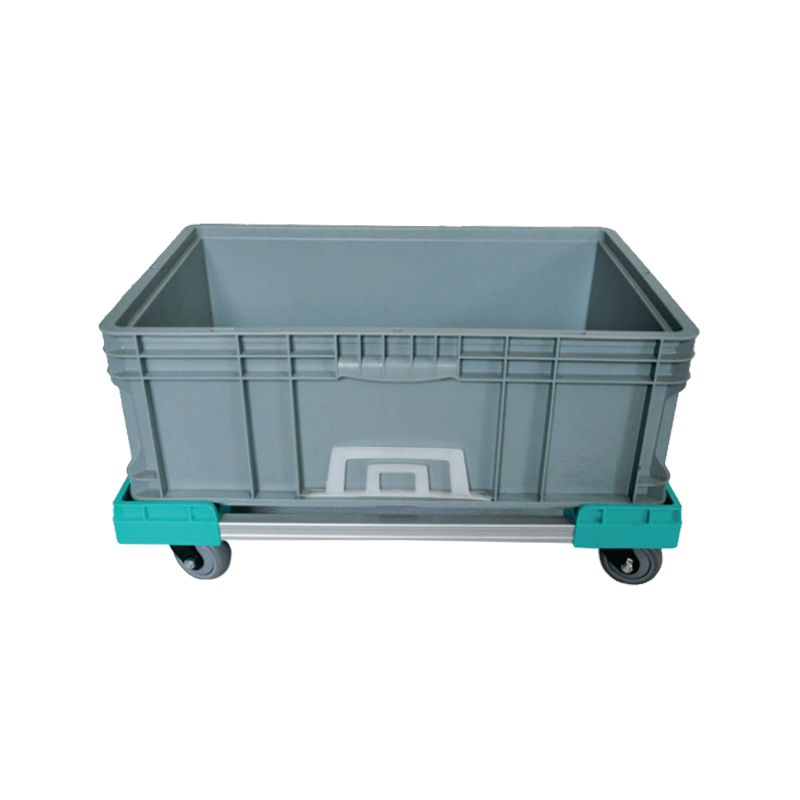Plastic pallet dollies have become a staple in modern warehouses, factories, and distribution centers due to their durability, lightweight construction, and resistance to corrosion. However, one of the often overlooked aspects of these essential tools is customization. In this article, we’ll explore how plastic pallet dollies can be tailored to meet specific operational needs, enhancing efficiency and productivity in various industries.
1. Why Customization Matters
Before diving into the specifics of customization, it’s important to understand why it matters. Not all workflows are the same, and different environments may require specialized solutions. For instance, a distribution center that handles large, heavy pallets may need a different dolly than one used in an assembly line that deals with smaller, more frequent loads.
Customization allows businesses to:
Maximize Efficiency: Tailoring dollies to specific tasks can minimize handling time and optimize movement.
Improve Safety: Customized dollies can address ergonomic concerns and reduce the risk of accidents.
Increase Durability: Custom materials or design elements can ensure that the dolly is fit for specific operational challenges, like exposure to chemicals or extreme temperatures.
Optimize Storage Space: Custom-sized dollies can fit more easily into tight storage areas, improving overall warehouse organization.
2. Custom Features for Plastic Pallet Dollies
Customization is not limited to just size. There are several aspects of the plastic pallet dolly that can be altered or added to meet unique requirements.
a. Size and Load Capacity
One of the most common customizations is adjusting the size and load capacity of the dolly. Standard dollies might not be sufficient for larger, heavier pallets or bulk items.
Oversized Dollies: For heavy-duty environments, customizing the dolly to fit larger pallets can reduce the need for multiple smaller dollies, streamlining the workflow.
Heavy-Duty Wheels: Choosing higher load capacity wheels can ensure that a dolly can carry more weight without failure. Larger wheels also offer better maneuverability, particularly in rough or uneven surfaces.
b. Specialized Wheels
The type of wheels on a pallet dolly can make a huge difference in its performance.
Material Selection: Depending on the environment, businesses can select wheels made from rubber, polyurethane, or thermoplastic. For example, environments with chemicals or oils might benefit from wheels made from a chemically resistant material.
Swivel vs Fixed: In tight spaces, swivel wheels can offer improved maneuverability. However, in areas where a dolly will be primarily used in straight lines, fixed wheels can provide more stability.
Braked Wheels: In busy warehouses or environments with slopes, adding brakes to the wheels can prevent dollies from rolling uncontrollably when not in use.
c. Handle Options
Plastic pallet dollies often come with standard handles, but customization can greatly improve user comfort and ergonomics.
Ergonomic Handles: For workers who push and pull the dollies frequently, customized handles designed for comfort can prevent strain and injury. These might include padded or adjustable handles.
Foldable or Retractable Handles: In smaller storage spaces, dollies with foldable or retractable handles can save space when the dolly is not in use.
d. Reinforced Corners and Edges
In environments where the dolly might face heavy impacts or rough handling, reinforcing the corners and edges can prolong its lifespan. These reinforcements may be made from more durable plastics or additional steel reinforcements embedded within the plastic frame.
e. Anti-Slip Surfaces
In settings where the dolly will be used to carry materials that might slip, adding anti-slip features to the surface of the dolly can improve safety.
Rubberized Coatings: For products that are prone to sliding around, a rubberized or textured surface can hold items in place during transportation.
Contoured Racks: Some customization options involve designing racks or compartments on the dolly to better secure items, preventing them from shifting or falling during movement.
3. Customization for Specific Industries
Plastic pallet dollies are used across a wide range of industries, each with its unique set of challenges. Customizing dollies for these industries can help optimize workflows and minimize inefficiencies.
a. Food and Beverage Industry
The food industry often requires pallet dollies that can withstand cleaning processes involving water, chemicals, or high temperatures.
Food-Grade Plastic: For hygiene reasons, plastic dollies used in food warehouses must be made from non-toxic, food-safe materials.
Easy-to-Clean Designs: Dollies with fewer crevices or smooth surfaces are easier to clean and disinfect, ensuring compliance with food safety standards.
b. Pharmaceutical Industry
The pharmaceutical industry requires precise handling of pallets containing sensitive products. Custom dollies can help minimize risk and increase operational efficiency.
Temperature Resistance: Certain pharmaceuticals must be kept in temperature-controlled environments. Custom plastic pallet dollies can be made from materials that resist both heat and cold, helping maintain temperature integrity.
Cleanroom Compliance: For cleanroom environments, dollies must be designed to prevent contamination. Custom options include sealed joints and smooth surfaces that reduce the accumulation of dust and debris.
c. Automotive Industry
In automotive manufacturing, plastic pallet dollies are frequently used to move parts, tools, and finished components. Custom dollies for this industry are often built for heavy-duty use.
High Load Capacity: Automotive plants require dollies that can carry significantly heavier loads. Custom dollies can be built with reinforced frames and specialized wheels to handle the demands of the industry.
Modular Designs: Some automotive operations benefit from modular dollies that can be reconfigured depending on the size and shape of the items being transported.
d. Retail and E-Commerce
For businesses in retail or e-commerce, the need for efficient pallet handling is crucial, especially when dealing with frequent inventory turnover.
Compact Sizes: E-commerce fulfillment centers may require smaller, more compact dollies that can easily navigate aisles and narrow spaces.
Multi-Functionality: Customizing dollies to include stacking capabilities or adjustable frames can help optimize storage and organization in fast-paced retail environments.

4. Technological Integrations
As industries increasingly adopt automation and smart technology, there is a growing trend of integrating technology into customized plastic pallet dollies.
RFID Integration: For better inventory tracking, RFID tags can be embedded into the dolly. This allows warehouse managers to quickly locate and track pallets without manual scanning.
Automation Compatibility: Some warehouses use robotic systems to move pallet dollies. Custom-designed dollies can be created with specific dimensions or attachment points to work seamlessly with these systems.
Smart Sensors: Adding sensors to monitor load weights or dolly movements can help optimize performance and provide real-time feedback for warehouse managers.
5. Cost vs. Value
While customization often comes at an additional cost, it’s important to weigh the value it brings. Customized plastic pallet dollies can lead to:
Increased Productivity: More efficient workflows, fewer breaks in operations, and less time spent managing pallet movements.
Enhanced Safety: Custom dollies can address ergonomic concerns and prevent injuries, reducing overall operational risks.
Long-Term Durability: Customization can improve the longevity of the dolly, making it a more cost-effective investment over time.
In the end, the decision to customize plastic pallet dollies depends on your business’s specific needs. Whether you’re operating in a high-volume e-commerce center or a specialized pharmaceutical facility, investing in customized solutions can significantly enhance operational efficiency and safety.
Conclusion
Customizing plastic pallet dollies is more than just a luxury—it’s a necessity for many businesses aiming to optimize their material handling operations. By tailoring dollies to suit specific workflows, industries can improve safety, efficiency, and long-term performance. As industries continue to evolve, the demand for customized plastic pallet dollies will likely increase, providing businesses with more opportunities to refine their processes and stay competitive in the marketplace.
